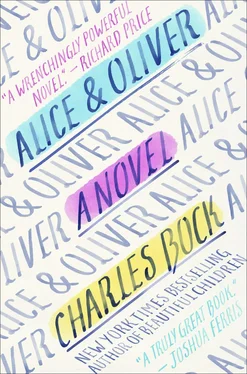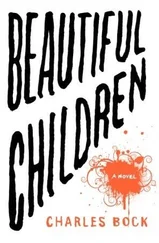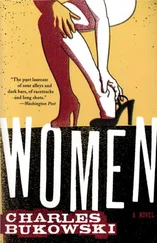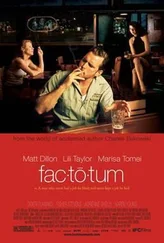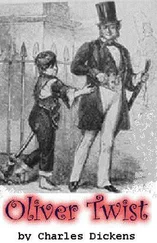Blechette’s. Originated in Eastern Europe and Russia. Sourced in the inbreeding that Jews in shtetls had to do over generations, these inbred cells that over the decades kept being crossbred. About a thousand living people diagnosed, worldwide, and there were probably more except, as the doctor and Merv had learned, it was a tricky disease to identify. Some Blechette carriers could live their entire lives without knowing they had it; others would die early and nobody’d know the root cause. The telltale indicator being something you saw only if you knew to look, explained the doctor. But looking usually happened when you tested for other things, and those other things kept not showing up, and via the process of elimination, way toward the bottom of your list, you tested something called the chitotriosidase activity in blood cells — known as your chito count, which was how this Mensa society had solved this mystery.
Being afflicted with Blechette’s meant being born without a minor, cell-producing enzyme in your bone marrow. The effects started early and increased as you got older, and once they accumulated, the lack of these helper cells in a bloodstream, as well as in key organs, could be, ah, problematic. This was known as a progressively degenerating disease. By the time most patients hit their twenties, their spleens had grown to at least eight times normal size, so one side of the stomach looked fatter. Other internal organs also could bulge, making you look pregnant or deformed. Scarring on your kidneys was an issue, and manifest in lots of night trips to the bathroom. An overactive spleen reduced your platelet count, made it harder for your blood to clot, so Blechetters bruised and bled — nosebleeds, bleeding gums, heavy menstrual flow, all that. The disease also lessened the number of white blood cells, meaning anemia was a problem. Bone disease became more likely, your bones turning brittle as they aged, osteoporosis going rampant, your spinal canal thickening with calcium deposits. One common result was losing control of your legs and sexual organs. They told Merv about one hulking guy — six feet five, exercised every day — whose spinal cord disintegrated to the point where if his car was tapped from behind, just a little fender bender, dude would be in a wheelchair for the rest of his life, so if there was anything he wanted to do with his life, doctors told the man to go and do it. Without any help, the average life span for the sufferer of Blechette’s was forty-one years. Merv was twenty-eight.
“But fret not,” Merv assured (as Alice stared in horror). The FDA approved a medicine, he told her, just under a year ago. Researchers culled it from the ovaries of striped Chinese hamsters. “Who even knew there were Chinese hamsters, let alone striped ones?” But those furry little bitches got drained into a two-thousand-liter bioreactor. They got synthesized, or bioreacted, some shit that Merv couldn’t follow. Something happened to the ovaries in the bioreactor, and afterward this new stuff got filtered into this harvest tank, where it was fermented, or synthesized, some shit. What they ended up with was this pure, rare protein, and it was this stuff what got shaped into the medicine, this stuff what acted as a replacement for the enzyme. Taken long enough, this wondrous wonder drug didn’t cure your Blechette’s, per se, but it started fixing the scar tissue on kidneys, it stopped the growth of internal organs, even built up bones, some. Biggest thing, patients didn’t get any worse. You got to live your life.
That’s why Merv was still in hospital: staying overnight, being tested to find out whether his chito activity had grown to where he needed the drug.
So his conundrum was this: each intravenous treatment cost fifteen thousand dollars.
Alice gasped.
“Yup. Third most expensive drug on the planet.”
All signs pointed to Merv going on it. His admittance chito numbers had been high enough. He was supposed to take some more advanced tests tomorrow to confirm.
Merv explained to Alice that patients took the drug intravenously every two weeks. So if he started treatment, he’d be responsible for fifteen thousand dollars a pop, every two weeks, basically for the rest of his life. Meaning he’d shatter the cap for his shitty musicians’ union insurance plan in a heartbeat, and he didn’t come close to making enough money to get on one of the higher-end plans — hell, he barely made enough each year to pay union dues.
Doctors said the drug company had a program to provide for patients who couldn’t afford the drug, but doing that meant Merv dropping his policy and being uninsured.
Doctors also told him about the lady with the disease who’d had five hip replacement surgeries by the time she hit forty, so being uninsured was insanity.
But could he really give up being a musician and go be a drone with a real job, be some secretary in a cubicle or some shit?
He answered his own question: “Fuck that.”
He shrugged. “I mean, what can they possibly be doing so that shit costs fifteen grand? That’s a five-hundred-dollar-a-day heroin habit.”
“You should be overjoyed.”
“Five hundred a day .”
One side of his mouth turned up, the crookedness of his smirk got more pronounced. “I guess that’s one more scary problem about being sick. You’re dependent on all these fuckers but for not one second do you believe they have your best interests at heart.”
She couldn’t even begin to tell him, couldn’t imagine where to start. “What’s money for, if not to pay for your health?”
“Know what? My old man went to the library. Turns out, the FDA developed the drug. Public tax money found that cure. Something called an orphan drug. Means the government has all kinds of rules on how to find cures for rare diseases. But some horseshit biotech company buys the patent. Turns out, the president of the company’s one of those FDA researchers. The company tells The Wall Street Journal that promising a ninety percent markup for the drug price is the only way they could raise enough capital to bring this shit to market — the drug has to be so expensive that it becomes profitable to the investors.”
“Believe me,” Alice said. “Western medicine is more than welcome to kiss my ass.”
“And since we lucky lemmings need them Chinese hamsters to live, the insurance companies have no choice. No biggie though. Just raise premiums to cover the cost. Everyone gets paid, the medical-industrial complex marches onward.”
“Maybe you should take a breath—”
He ignored her: “And it’s not like I can ask my parents to float the insurance. I’ve put them through so much already—”
“I’m sorry for you.” Alice cut him off, her tone polite, but forceful enough, snapping him back into the real world.
She waited until his body language softened.
“I’m still not sure you have the right to be mad,” she said.
His eyes narrowed.
“This is saving your life? The processed hamster ovaries work? There’s an organizational structure, however unjust, that’s for paying for this. For a while anyway?”
He shrugged his shoulders.
“Maybe you could be thankful?”
“Right.”
“Instead you want to refuse.”
“I know,” his voice acquiescent. “Every drug company’s this way.”
“So you can keep doing background tracking for scale? So hungover fools at the Sidewalk Cafe can hear your especially ripping version of ‘Take the A Train’?”
His brow hardened. His eyes now dark pebbles.
“Believe me,” Alice said. “I intimately understand clinging to every scrap of your creative life.”
She waited for him to respond in some way, acknowledge her point. Though this response did not come, Alice proceeded, however gently: “Why can’t you be like ninety-nine percent of the creative people in Manhattan who have to make their art in their spare time?” Then her patience was at an end. “You’re being a spoiled child.”
Читать дальше
